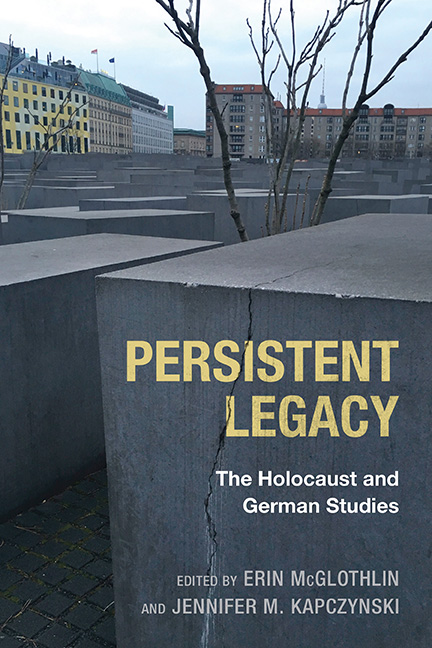Book contents
- Frontmatter
- Contents
- Acknowledgments
- Introduction
- Part I Abiding Challenges
- Part II The Holocaust in German Studies in the North American and the German Contexts
- Part III Disentangling “German,” “Jewish,” and “Holocaust” Memory
- Part IV Descendant Narratives of Survival and Perpetration
- Part V Remediated Icons of Memory
- Part VI Holocaust Memory in Post-Holocaust Traumas
- Notes on the Contributors
- Index
11 - Felix Moeller’s Harlan: Im Schatten von Jud Süss as Family Drama
Published online by Cambridge University Press: 17 June 2021
- Frontmatter
- Contents
- Acknowledgments
- Introduction
- Part I Abiding Challenges
- Part II The Holocaust in German Studies in the North American and the German Contexts
- Part III Disentangling “German,” “Jewish,” and “Holocaust” Memory
- Part IV Descendant Narratives of Survival and Perpetration
- Part V Remediated Icons of Memory
- Part VI Holocaust Memory in Post-Holocaust Traumas
- Notes on the Contributors
- Index
Summary
IN THE LAST TWO DECADES contemporary cinema globally has been marked by a strong autobiographical trend, a movement expressed through various strategies involving the use of audiovisual media and the blurring of former categorical boundaries. In his book The Subject of Documentary, Michael Renov locates as one of the more important subgenres within the autobiographical discourse a category of documentary films and videos he labels “domestic ethnography.” “The notion of domestic ethnography,” he writes, “has become an increasingly useful classificatory term for a documentary film type that has proliferated. In an era of great genealogical curiosity such as our own, shared DNA becomes a powerful incitation to documentary practice.”
My present task entails a reading of Felix Moeller’s documentary Harlan: Im Schatten von Jud Süss (2009) as a non-autobiographical Holocaust family film driven nevertheless by many of the generic compulsions that we find in such recent autobiographical documentaries as Jens Schanze’s Winterkinder: Die schweigende Generation (Winter Children: The Silent Generation, 2005) or Malte Ludin’s 2 oder 3 Dinge, die ich von ihm weiß (2 or 3 Things I Know About Him, 2004)—to name two such family films dealing with the Nazi past within the realm of perpetrator postmemory.
Jens Schanze’s Winterkinder, his film thesis for the School for Television and Film in Munich, explores his mother’s memories of her father, a high-ranking functionary of the Nazi party. Neither Schanze nor his four sisters actually knew their grandfather, who died in an automobile accident in 1954. In the stories and descriptions of him by their mother, he was always referred to simply as “that good man.” Indeed, what we discover already at the outset of Winterkinder is that we are dealing with a three-generational family in which there has been a virtual sixty-year silence regarding Grandpa’s twelve-year affiliation with the NSDAP as a member of the Storm Troopers.
- Type
- Chapter
- Information
- Persistent LegacyThe Holocaust and German Studies, pp. 214 - 226Publisher: Boydell & BrewerPrint publication year: 2016
- 1
- Cited by

